Правила в семье и дома на английском языке с переводом. Правила поведения дома на английском языке с переводом
Правила в семье и дома на английском языке с переводом
Perhaps, only at home we can truly unwind and relax, including from the conventions of social life. But, you see, the order in his "fortress". It provides the basic rules of family etiquette. It "grow legs" understanding the rules of etiquette in society.Comfortable home life make the words "thank you", "please", "sorry", "good morning", "good appetite", "good night," and the habit of respectful listening to all family members, not interrupting in mid-sentence. Also it is considered good practice to inform all family members where youre going and how much intend to return.For all households are required cleanliness and neatness of clothing. First of all, the example should show the parents, because their appearance is one way of upholding its authority in children.The rules in the family Among family members are often affectionate Pets nickname: "Kitten", "Sun", "Bunny" and so on. They are quite acceptable if not mentioned in the presence of strangers. Also, in conversation with third persons, not called their wife or husband spouse, this position is assigned only at official events. It would be more appropriate to call their other half by name.Appeal to the older generation of the family also requires sensitivity. Completely unacceptable, referring to his mother-in-law, calling her "grandma". If the family has not made contact to his parents, wife or husband "mom" and "dad", rules of etiquette allow pinging by name and patronymic and on "you". While grandchildren may well be called grandmother or grandfather.Rules of family etiquette husband always apply coats wife, both at home and in public. In addition, it is worth passing the door, miss wife first and offer her a hand at the exit of public transport. The first dance on the evening of the same remains for your spouse.In turn, the wife should not be in the absence of her husband to invite guests and accept invitations from people whom he disliked. Also improper to restore order in his personal things, you should check your pockets and wallet. Shouldn unflattering things about her husband in the presence of children. Mutual respect all members of the family is born not on an empty place.Parents ought not be read without the consent of their childrens personal letters or diaries. Entering someone elses room, you should knock.The rules in the family is Not worth it to strangers unnecessarily berating children, lecturing to a close. Do not wash your dirty linen in public. But even if the showdown cannot be avoided, one should not raise his voice and use profanity. Moreover, should not quarrel in front of children. Also try to protect childrens ears from gossip and perelivania bones that have just gone missing guests or relatives.Tactless to complain about the husband or wife outside the family circle, to bring personal life and also give unsolicited advice to resolving family conflicts friends. It is enough just to Express sympathy, if your friend shares the problems of an intimate nature.Older relatives ought not to stand neither on one side of the conflict between husband and wife. The best way is neutrality.Also in the family should be unified rules of parenting: the same requirements, the system of rewards and punishments. Even if the older generation does not agree with parenting grandchildren, you should not argue in front of the kids.Tact, ability to find common language and mutual courtesy is the basis for good communication in the family.
Оцени ответ
shkolniku.com
Рассказываем об обязанностях по дому на английском языке
| Автор: София СтальскаяВысшее лингвистическое образование. Опыт работы 5 лет. |
Слова и выражения по теме (прослушать)
Это, конечно же, обязанности по дому, которые по-английски называются Household chores либо Household duties:
to keep the house – вести домашнее хозяйство
to air the room – проветривать комнату
to clean the windows – чистить окна
to dust the furniture – вытирать пыль с мебели
to go shopping – ходить за покупками
to iron/to do the ironing — гладить
to make the beds – убирать постель
to polish the furniture – натирать мебель до блеска
to prepare a meal/to cook – готовить еду
to help with the cooking – помогать с готовкой
to set the table/to lay the table – накрывать на стол
to sweep the floors – подметать пол
to take the rubbish away/out – выносить мусор
to tidy up — убираться
to vacuum — пылесосить
to wash the clothes/to do the laundry – стирать
to wash the dishes/to do the washing up – мыть посуду
to watch the kids – смотреть за детьми
to water the plants – поливать цветы
Важно! Не забывайте, частичка «to» указывает на неопределенную форму глагола, т. е отвечающую на вопросы «что делать? Что сделать?»: to clean the windows НО I clean the windows regularly.
Рассказывая о домашних обязанностях вы также можете использовать слова, указывающие на то, как часто вы это делаете:
regularly – регулярно
every Sunday, weekend – каждое воскресенье, выходные
once a day/a week/a month – один раз в день/неделю/месяц
twice a day/a week/a month – дважды в день/неделю/месяц
three/four times a day/a week/a month – три/четыре раза в день/неделю/месяц
Употребление слов и выражений по теме в речи
Поскольку такие обязанности выполняются регулярно, используйте Present Simple, чтобы рассказать о том, что вы обычно делаете дома. Не забывайте добавлять окончание «s» к глаголам в третьем лице единственного числа, как в этом примере:
Carol lives with her mother and father and her little brother Tom. Every morning Carol makes her bed and helps her mother with the cooking. She doesn’t like ironing, but she likes to watch her little brother. Every Sunday they all tidy up. Carol sweeps the floors and her father cleans the carpets. Then she dusts the furniture. Her mother usually does the laundry on Sundays. And Tom always waters the plants. In the afternoon they go shopping together. In the evening the set the table and have dinner.
Чтобы запомнить новые слова и повторить Present Simple, выполните упражнения.
Задания к уроку
Задание 1. Ответьте на следующие вопросы:
- What does Carol do every morning?
- What does Carol like?
- What does her father do om Sunday?
- What does her mother do every morning?
- What do they do on Sunday together?
Задание 2. Соедините части фраз так, чтобы получились правильные выражения:
| to make | the plants |
| to wash | the windows |
| to watch | shopping |
| to water | the kids |
| to clean | the clothes |
| to dust | the beds |
| to go | a meal |
| to prepare | the furniture |
Задание 3. Дополните предложения:1.I don’t like to do the … up.2. Nick always … the floors and makes his … .3. Can you … the plants, please?4. I forgot to take the … out.5. We will … shopping tomorrow.6. It’s stuffy here, I will open the window to … the room.7. Alice asked her sister to watch the … .8. Jenny … the floors twice a week.
- Carol makes her bed and helps her mother with the cooking every morning.
- Carol likes to watch her little brother.
- Her father cleans the carpets om Sunday.
- Her mother cooks every morning.
- They tidy up, go shopping and have dinner together on Sundays.
Ответ 2.
| to make | the beds |
| to wash | the clothes |
| to watch | the kids |
| to water | the plants |
| to clean | the windows |
| to dust | the furniture |
| to go | shopping |
| to prepare | a meal |
Ответ 3.1. I don’t like to do the washing up.2. Nick makes his bed every morning.3. Can you water the plants, please?4. I forgot to take the rubbish out.5. We will go shopping tomorrow.6. It’s stuffy here, I will open the window to air the room.7. Alice asked her sister to watch the kids.8. Jenny sweeps the floors twice a week.
порядок в доме - Перевод на английский - примеры русский
На основании Вашего запроса эти примеры могут содержать грубую лексику.
На основании Вашего запроса эти примеры могут содержать разговорную лексику.
Помоги мне навести порядок в доме, пожалуйста.
Она помогла своей матери навести порядок в доме.
Подобно многим городским жительницам, они, прежде всего, поддерживают уют и порядок в доме.
Like many of their urban colleagues, they are first and foremost homemakers.Похоже, Дженкс... наводит порядок в доме.
Помощники и его жена наводят порядок в доме и во дворе.
Попытки правительства Либерии «навести порядок в доме» потребуют принятия ряда радикальных мер, включая реформирование гражданской службы.
The efforts of the Government of Liberia to "put the house in order" would require taking some drastic measures, including reforming the civil service.Например, Христианский детский фонд оказывает поддержку группам соседей, которые помогают Бараке и ее братьям и сестрам поддерживать порядок в доме, сохранять семью и продолжать посещать школу.
Короче, я наводил порядок в доме, разбирал вещи матери, свои и брата.
Благоприятным фактором является и то, что при осуществлении своей задачи Рабочая группа намеревалась, так сказать, навести порядок в доме, наладив сотрудничество между всеми действующими в Африке субъектами.
It is fortunate that in the performance of its task, the Working Group wanted to - so to speak - bring order into the house - by bringing together all the actors in Africa.Степень, в какой при разделе семейного имущества в случае расторжения брака признается нефинансовый вклад в брак (например, жена поддерживает чистоту и порядок в доме), неясна.
The extent to which the division of matrimonial property on divorce recognizes non-financial contributions to the marriage (e.g., wife looking after the home) is unclear.Мы делаем многое, ну например, кто-то заботится о животных, кто-то работает в саду, а кто-то поддерживает порядок в доме.
Нужно навести порядок в доме.
Наводит порядок в доме.
Наводим порядок в доме.
Когда в жизни беспорядок, навожу порядок в доме.
Whenever my life's a mess, I just do some housework.Внутри семьи девочки занимают более важное положение, чем мальчики, так как они поддерживают порядок в доме, ухаживают за своими родителями, когда те стареют, и вообще больше считаются с мнением родителей, особенно при выборе мужа.
Within the family, girls held a more important position than boys, as they maintained the home, looked after their parents when they grew old and, generally speaking, were more acquiescent to their parents' views, particularly concerning the choice of husband.Я наведу порядок в доме.
context.reverso.net
помогите напишите 10 правил этикета в России на английском языке с переводом Пожалуйста
Courtesy Courtesy is a set of good manners which we use in everyday life. Good manners and rules of behavior at home, work, transport or other places, are very important in modern society. Even in ancient times people had to observe certain rules of conduct, which made their lives easier. A person is seen and evaluated through his behavior and communication with other people. If someone has a rich and beautiful inner world he or she demonstrates high level of social etiquette. Sometimes when we simply say “Hello!” meeting people and “Good Bye!” leaving, it shows our good manners. It is also necessary to use polite words in formal situations and when talking to strangers or elderly people. For men it is a good manner to let women go first. Most people hold doors for the next visitor in stores, restaurants and other public places. Young people ought to give place to older and disabled people in public transport. Pregnant women and little children also have a priority in such situations. Table manners are another important issue. While at formal dinners, people usually eat with fork and knife. Soon after sitting down at the table it is correct to put a napkin on your lap. Well-mannered people usually know the rules of table setting. When there is a variety of silverware in front of you, it’s a good idea to start with the knife, fork or spoon that is farthest from your plate. Not everyone knows the rules of courtesy. There are also many people who have bad manners. For example, they talk or laugh loudly in public places, which is not acceptable. They litter in the streets or cause inconvenience to other people. They stare at people they don’t know and never say “Sorry!” or “Thank you!” Such behavior should be avoided if we want to be a part of civilized society. ЭТИКЕТ Этикет представляет собой набор хороших манер, которые мы используем в повседневной жизни. Хорошие манеры и правила поведения дома, на работе, транспорте или других местах, очень важны в современном обществе. Еще в древние времена люди должны были соблюдать определенные правила поведения, которые облегчали им жизнь. Человека видят и оценивают через его поведения и общения с другими людьми. Если у кого-то богатый и красивый внутренний мир, то он или она располагают высоким уровнем социального этикета. Иногда, когда мы просто говорим "Привет!" при встрече с людьми и «До свидания!" уходя, это указывает на наши хорошие манеры. Помимо этого, в официальных ситуациях и при разговоре с незнакомыми или пожилыми людьми необходимо использовать вежливые слова. Для мужчин хорошей манерой является пропускать женщин вперед. Большинство людей придерживают двери для следующего посетителя в магазинах, ресторанах и других общественных местах. Молодежь должна уступать место пожилым людям и инвалидам в общественном транспорте. Беременные женщины и маленькие дети также имеют приоритет в таких ситуациях. Застольные манеры – еще один важный вопрос. Во время официальных обедов люди обычно едят вилкой и ножом. Вскоре после того, как вы сели за стол, нужно положить салфетку на колени. Хорошо воспитанные люди обычно знают правила сервировки стола. Когда перед вами различные столовые приборы, хорошо бы начать с ножа, вилки или ложки, которые наиболее удалены от вашей тарелки. Не все знают правила этикета. Существует также много людей, у которых плохие манеры. Например, они громко говорят или смеются в общественных местах, что является неприемлемым. Они мусорят на улицах или причиняют неудобства другим людям. Они глазеют на людей, которых совсем не знают и никогда не говорят "Простите!" или "Спасибо!". Такого поведения следует избегать, если мы хотим быть частью цивилизованного общества.
Может вам ещё на грудь насрать олимпийскими кольцами
Courtesy Courtesy is a set of good manners which we use in everyday life. Good manners and rules of behavior at home, work, transport or other places, are very important in modern society. Even in ancient times people had to observe certain rules of conduct, which made their lives easier. A person is seen and evaluated through his behavior and communication with other people. If someone has a rich and beautiful inner world he or she demonstrates high level of social etiquette. Sometimes when we simply say “Hello!” meeting people and “Good Bye!” leaving, it shows our good manners. It is also necessary to use polite words in formal situations and when talking to strangers or elderly people. For men it is a good manner to let women go first. Most people hold doors for the next visitor in stores, restaurants and other public places. Young people ought to give place to older and disabled people in public transport. Pregnant women and little children also have a priority in such situations. Table manners are another important issue. While at formal dinners, people usually eat with fork and knife. Soon after sitting down at the table it is correct to put a napkin on your lap. Well-mannered people usually know the rules of table setting. When there is a variety of silverware in front of you, it’s a good idea to start with the knife, fork or spoon that is farthest from your plate. Not everyone knows the rules of courtesy. There are also many people who have bad manners. For example, they talk or laugh loudly in public places, which is not acceptable. They litter in the streets or cause inconvenience to other people. They stare at people they don’t know and never say “Sorry!” or “Thank you!” Such behavior should be avoided if we want to be a part of civilized society. ЭТИКЕТ Этикет представляет собой набор хороших манер, которые мы используем в повседневной жизни. Хорошие манеры и правила поведения дома, на работе, транспорте или других местах, очень важны в современном обществе. Еще в древние времена люди должны были соблюдать определенные правила поведения, которые облегчали им жизнь. Человека видят и оценивают через его поведения и общения с другими людьми. Если у кого-то богатый и красивый внутренний мир, то он или она располагают высоким уровнем социального этикета. Иногда, когда мы просто говорим "Привет!" при встрече с людьми и «До свидания!" уходя, это указывает на наши хорошие манеры. Помимо этого, в официальных ситуациях и при разговоре с незнакомыми или пожилыми людьми необходимо использовать вежливые слова. Для мужчин хорошей манерой является пропускать женщин вперед. Большинство людей придерживают двери для следующего посетителя в магазинах, ресторанах и других общественных местах. Молодежь должна уступать место пожилым людям и инвалидам в общественном транспорте. Беременные женщины и маленькие дети также имеют приоритет в таких ситуациях. Застольные манеры – еще один важный вопрос. Во время официальных обедов люди обычно едят вилкой и ножом. Вскоре после того, как вы сели за стол, нужно положить салфетку на колени. Хорошо воспитанные люди обычно знают правила сервировки стола. Когда перед вами различные столовые приборы, хорошо бы начать с ножа, вилки или ложки, которые наиболее удалены от вашей тарелки. Не все знают правила этикета. Существует также много людей, у которых плохие манеры. Например, они громко говорят или смеются в общественных местах, что является неприемлемым. Они мусорят на улицах или причиняют неудобства другим людям. Они глазеют на людей, которых совсем не знают и никогда не говорят "Простите!" или "Спасибо!". Такого поведения следует избегать, если мы хотим быть частью цивилизованного общества.
touch.otvet.mail.ru
Правила поведения - английский язык, уроки
презентация ученицы 10 класса Бадабян Светланы выполнена по теме "правила поведения " к учебнику М.З.БИБОЛЕТОВОЙ "Happy English." 10 класс и является итогом обсуждения в группе важности хороших манер в школе работа направлена на развитие устной речи , умение обобщать ...
Просмотр содержимого документа «Правила поведения »

Classroom rules
Khalatyan I.M.-teacher of English
Badalyan Svetlana
Student of the 10 th Form
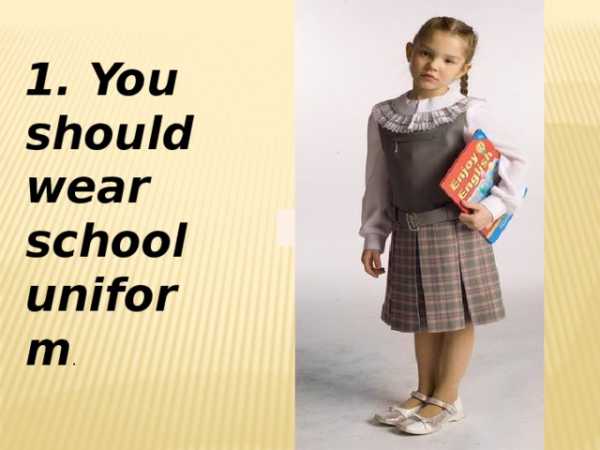
1. You should wear school uniform .
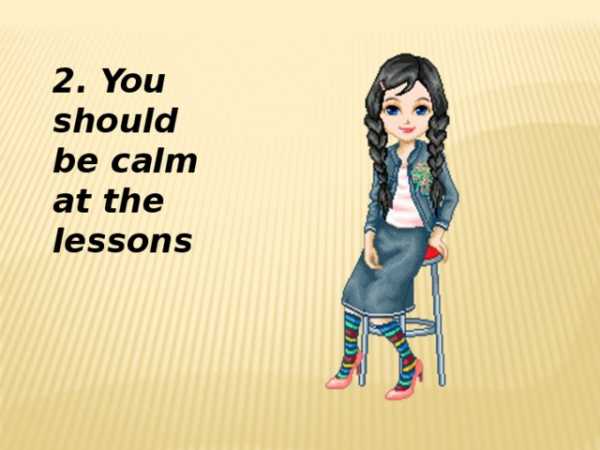
2. You should be calm at the lessons

3.You should do your homework
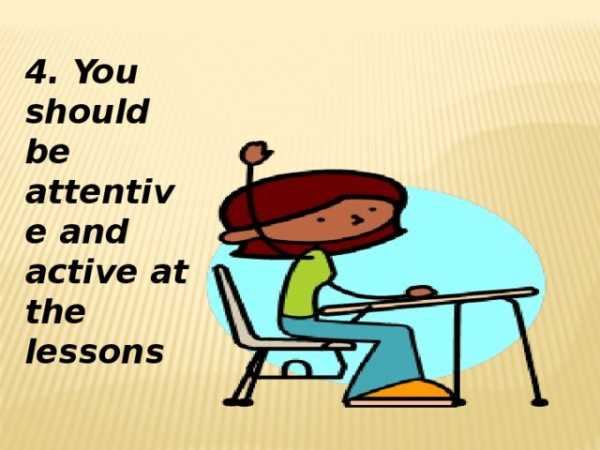
4. You should be attentive and active at the lessons
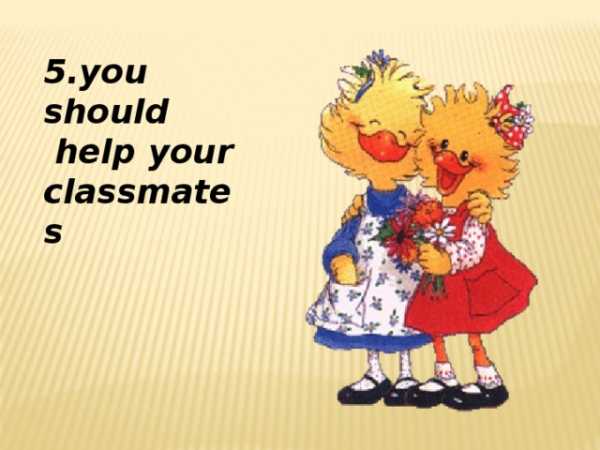
5.you should help your classmates

6. You should respect your teachers

7. You should listen to your teachers
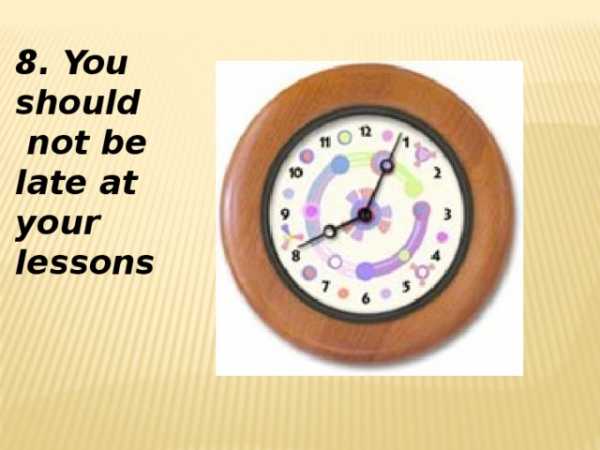
8. You should not be late at your lessons
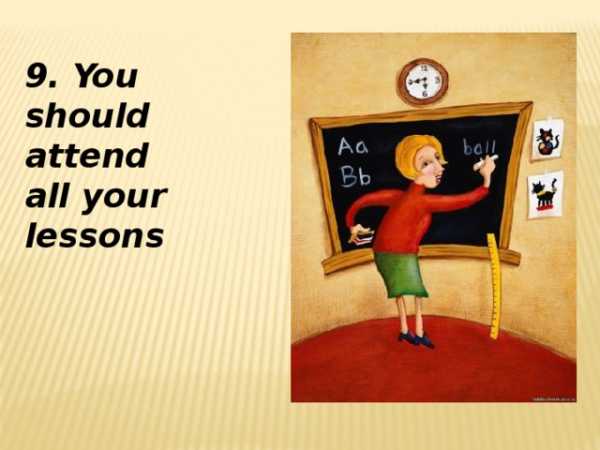
9. You should attend all your lessons
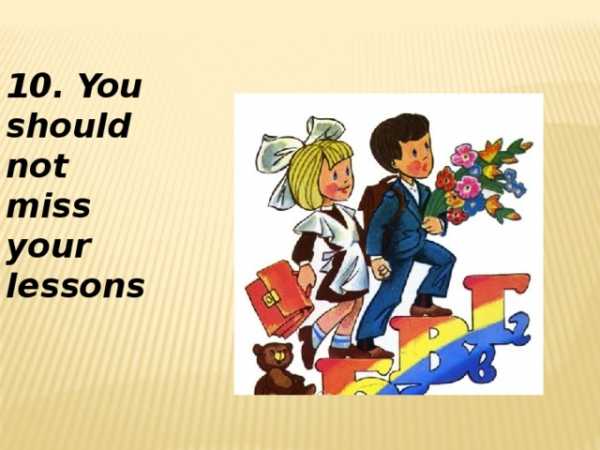
10. You should not miss your lessons
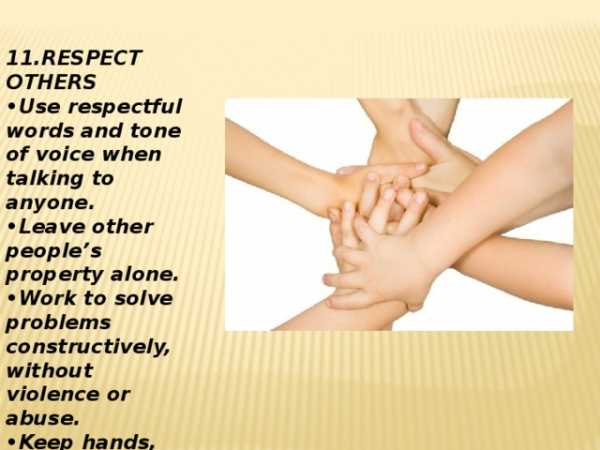
11.RESPECT OTHERS
• Use respectful words and tone of voice when talking to anyone.
• Leave other people’s property alone.
• Work to solve problems constructively, without violence or abuse.
• Keep hands, feet and objects to yourself.
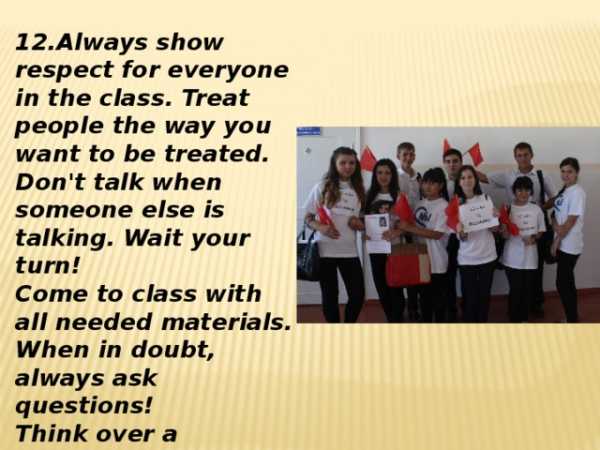
12.Always show respect for everyone in the class. Treat people the way you want to be treated.
Don't talk when someone else is talking. Wait your turn!
Come to class with all needed materials.
When in doubt, always ask questions!
Think over a question or problem before asking a question.
kopilkaurokov.ru
Правила поведения в гостях на английском языке
School and Classroom Rules
RESPECT OTHERS •Use respectful words and tone of voice when talking to anyone. •Leave other people’s property alone. •Work to solve problems constructively, without violence or abuse. •Keep hand, feet and objects to self.
BE PREPARED TO LEARN •Be in your seat and ready when class begins •Have appropriate materials. •Have your homework completed.
FOLLOW INSTRUCTIONS •Follow reasonable instructions from adults the first time given.
DO YOUR BEST •Participate positively in class •Stay on task. •Learn all you can (http://wms.athwest.k12.or.us/classroomrules)
Class Rules Set #1
Always show respect for everyone in the class. Treat people the way you want to be treated. Dont talk when someone else is talking. Wait your turn! Come to class with all needed materials. When in doubt, always ask questions! Through attempt a question or problem before asking a question.
--------------------------------------------------------------------------------
Class Rules Set #2
Students will be on time, in their seat, and ready to go when the bell rings. Students will bring all needed materials to class. No food or drink in the classroom. This includes gum, candy, and water. All electronic device, unless medical, are forbidden. All electronic watches which emit loud alarms must be turned off. Students will also obey all district and school rules.
--------------------------------------------------------------------------------
Class Rules Set #3
Bring all your materials ( including homework ) with you every day. Come to class regularly and not be tardy. Sharpen your pencil before the tardy bell rings. Use the restroom between classes or during lunch. Please do not ask unless it is an emergency. Do not talk when the teacher is talking. Do not chew gum in class. Do not bring drinks to class. Be respectful to teacher and to one another. Have a positive attiude.
--------------------------------------------------------------------------------
Class Rules Set #4
Be in the classroom and seated by bell, each day. Those not in their seats at the start of class time will be counted tardy. Tardies will be handled according to school policy. No one will be allowed to leave the classroom without a pass from a staff member. Have locker and restroom needs taken care of before coming to class. Hats shall not be worn during class. Please remove hats upon entering the classroom. Be courteous! Do not talk while the teacher or another student is presenting material. Respect other peoples feelings! Follow directions the first time they are given. Stay on task!
Оцени ответ
shkolniku.com



